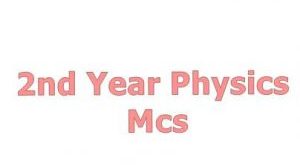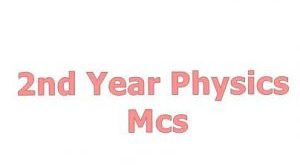Physics Chapter 2 is about the study of Vectors and Equilibrium. Vector is a quantity that has both Magnitude and Direction but Scalar has magnitude only. Coordinates of Vectors, Addition, Resultant, Multiplication, Subtraction, Unit, Null, Equal, Position Vectors describes the properties of Vectors. Vector Addition by Rectangular Components, Scalar Product, Vector Product, and Torque are also illustrated in this Chapter. Equilibrium occurs when all the forces or torques acting on a body are equal. There are two conditions of Equilibrium including Equilibrium of Forces and Equilibrium of Torques.
1st Year Physics Chapter # 2 KEY POINTS
- Vectors
- Rectangular Components of a vector
- Position Vector
- Vector Addition by Rectangular Components
- Scalar Product and Vector Product
- Torque
- Conditions of Equilibrium
1st year physics chapter 2 MCQs
Question #1: Rectangular coordinate system is also called?
- Polar coordinate system
- Cartesian coordinate system
- Cylindrical-coordinate system
- Spherical coordinate system
Answer
Answer
Question #2: . The direction of a vector in space is specified by?
- One angle
- Two angle
- Three angle
- No angle
Answer
Answer
Question #3: Addition of vector obey?
- Commutative law
- Distributive law
- Associative law
- All of these
Answer
Answer
Question #4: Which of the following statement is correct about force and velocity?
- Force and velocity both are scalars
- Force and velocity both are vectors
- Force is scalar and velocity is vector
- Force is vector and velocity is scalar
Answer
Answer
Question #5: Unit vector n is along?
- x-axis
- Normal on a surface
- y-axis
- z-axis
Answer
Answer
Question #6: Cosθ i + Sinθ j is a?
- Vector
- Position vector
- A vector in the direction at angle θ with x-axis
- The unit vector in the direction at angle θ with x-axis
Answer
Answer
Question #7. Maximum number of rectangular components are?
- One
- Two
- Three
- Infinite
Answer
Answer
Question #8. The maximum number of components of a vector maybe?
- One
- Two
- Three
- Infinite
Answer
Answer
Question #9. Which one is not correct for a vector A = √2i +√2j?
- has direction θ = 45° with x-axis
- has magnitude
- has magnitude 2 and direction θ = 45° with the y-axis
- has magnitude -2
Answer
Answer
Question #10. The result of two forces of equal magnitudes is also equal to the magnitude of the forces. The angle between the two forces is?
- 30°
- 60°
- 90°
- 120°
Answer
Answer
Question #11. What is the angle that the given vector makes with y-axis A = 2i + √.12 j?
- 30°
- 60°
- 90°
- 120°
Answer
Answer
Question #12. In which quadrant the two rectangular components of a vector have same sign?
- 1st
- 2nd
- Both 1st and 3rd
- 4th
Answer
Answer
Question #13. Two vectors A and B are making angle θ with each other. The scalar projection of vector B on vector A is written as?
- A.B/A
- A.B/B –
- A.cosθ
- Both a and b are correct
Answer
Answer
Question #14. Two vectors are A = 3i + 2j – k and B = 3i – 2j + k then?
- B is antiparallel to A
- B is inclined at 60° with A
- B has a negative magnitude
- B is perpendicular to A
Answer
Answer
Question #15. Arc of a triangle formed by vectors i and (i – j) is?
- 1
- 0
- ½
- Triangle cannot be formed by these vectors
Answer
Answer
Question #16. Which of the following is a scalar quantity?
- The braking force needed to stop the car
- The heat needed to boil some water
- The effort needed to hammer a nail into wood
- The thrust needed to lift a rocket off the ground
Answer
Answer
Question #17. Which is not a correct relation?
- A x B = A x B
- |A x B| = – |B x A|
- A x B = ABSinθn
- B x A = ABSinθ (-n)
Answer
Answer
Question #18. Out of the following set of forces, the resultant of which triplet cannot be zero?
- 10, 10, 10
- 10, 10, 20
- 10, 20, 40
- 10, 20, 20
Answer
Answer
Question #19. If east, west, north, south, up and down are representing the direction of unit vectors, then east x south has direction along?
- West
- North
- Down
- Up
Answer
Answer
Question #20. Null Vector is a vector which has?
- Zero magnitude
- No specified direction
- Both a and b are correct
- Both a and b are not correct
Answer
Answer
Question #21. Which one is a unit vector?
- √3i + √3j + √3k
- 1/√3 i + 1/√3j + 1/√3 k
- √3/3 i + √3/3j + √3/3 k
- Both b and c are correct
Answer
Answer
Question #22. Angle between A = i and B = i – j is?
- 0°
- 45°
- 90°
- 270°
Answer
Answer
Question #23. The magnitude of the cross product of two vectors is equal to the dot product between them. The angle between the two vectors?
- 30°
- 45°
- 60°
- 180°
Answer
Answer
Question #24. An airplane flies 400m due north and then flies 300m south and then flies 1200m. The net displacement is?
- 1500m
- 1200m
- 900m
- 700m
Answer
Answer
Question #25. A vector contains more information than a scalar. What is this extra information?
- Acceleration
- Direction
- Size
- Resultant
Answer
Answer
Question #26. Five equal forces of 10N each are applied at one point and all are lying in one place. If the angles between them are equal, the resultant force will be?
- 10N
- 20N
- 10 √2 N
- Zero
Answer
Answer
Question #27. The torque acting on a body determines?
- Acceleration
- Linear acceleration
- Angular acceleration
- The direction of motion of the body
Answer
Answer
Question #28. The torque acting on a body determines?
- [MLT-1]
- [ML2T-1]
- [ML2T-2]
- [ML2T]
Answer
Answer
Question #29. A body will be in complete equilibrium when it is satisfying?
- 1st condition of equilibrium
- 2nd condition of equilibrium
- Both 1st and 2nd condition of equilibrium
- Impossible
Answer
Answer
Question #30. A body in equilibrium is?
- At rest
- In motion
- At rest or in uniform motion
- All are correct
Answer
Answer
Question #31. Three coplanar forces acting on a body keep it in equilibrium. They should therefore be?
- Concurrent
- Non-concurrent
- Parallel
- Non-parallel
Answer
Answer
Question #32. Which of the following pairs does not have identical dimensions?
- Torque and energy
- Momentum and impulse
- Energy and work
- Mass and moment of inertia
Answer
Answer
Question #33. A central force is that which?
- Can produce torque
- Can’t produce torque
- Some time can produce torque some time can’t
- Has no relation with torque
Answer
Answer
Question #34. It is easier to turn a steering wheel with both hands than with a single hand because?
- Acceleration force increase on the wheel
- Two forces act on the wheel
- Two hands provide a firm grip
- The couple acts on the wheel
Answer
Answer
Question #35. A force of 10N is acting along the y-axis. Its component along the x-axis is?
- Zero
- 10N
- 100N
- 5N
Answer
Answer
Question #36. The unit vector in the direction of vector A = 2i – 2j + k is?
- 2i – 2j + k/2
- 2i – 2j + k/9
- 2i – 2j + k/3
- 2i – 2j + k/5
Answer
Answer
Question #37. The magnitude of i.jxk is?
- 0
- 1
- -1
- i
Answer
Answer
Question #38: In which quadrant only, the value of ‘tan’ will be positive?
- First
- Second
- Third
- Both 1st and 3rd
Answer
Answer
Question #39: The cross product of two vectors is zero when?
- They are parallel vectors
- They are anti-parallel vectors
- They are perpendicular vectors
- Both a and b are correct
Answer
Answer
 Online Exams Tests Preparation
Online Exams Tests Preparation


